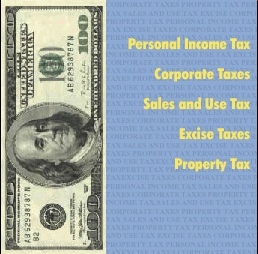
 |
California's Tax SystemA PrimerChapter 5 |
California imposes an insurance tax; estate tax; alcoholic beverage tax; and various tobacco-related, gambling-related, and motor vehicle-related levies. In addition, employees and employers pay taxes into trust funds to finance the state's disability and unemployment insurance programs.
Implemented in 1911, the insurance tax is one of the oldest taxes in California. The tax is levied on the premiums sold by insurance companies, and is in place of all other state taxes on insurance companies except real estate taxes and license fees. The fourth largest General Fund revenue source, it raised an estimated $1.3�billion (2�percent of the total) in 1999-00 from the approximately 2,000 companies subject to it.
The fifth largest source of General Fund taxes, the Estate Tax and the Generation-Skipping Transfer (GST) Tax accounted for an estimated $937�million in 1999-00, or a bit under 2�percent of the total.
This tax was established by Proposition�6 in June 1982, which eliminated the state's Inheritance and Gift Tax law. The tax is levied on the adjusted value of property holdings of individual taxpayers upon their deaths. However, the tax imposes no net burden on California taxpayers. This is because federal law allows for a credit against the federal estate tax for any state estate taxes paid, and the state's rate is set equal to the maximum allowable federal credit. Since the state is able to "pick up" revenues for itself at no cost to taxpayers through this mechanism, the state's tax is often referred to as the estate pick up tax.
| Example of How California's Estate "Pick-Up" Tax Works | ||
| Total Taxes on an $800,000 Estate | ||
| Without State Tax | With State Tax | |
| Gross federal tax | $65,750 | $65,750 |
| Minus maximum allowable credit for state tax | -- | 25,680 |
| Equals net federal tax | $65,750 | $40,070 |
| State pick-up tax | -- | 25,680 |
| Total federal and state taxes paid by estate | $65,750 | $65,750 |
Similar to the estate tax, California's GST tax is equal to the amount allowable as a credit under federal law. The GST tax is imposed only on the value of interests in property that actually pass to certain transferees.
Motor vehicle-related levies are the main source of state special fund revenues, accounting for an estimated $8.4�billion--or over half of the special fund total.
Accounting for the largest share of motor vehicle-related levies, state fuel taxes are of three types.
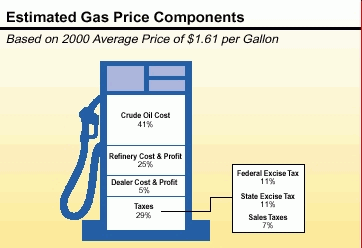
The tax rates are $0.18 per gallon for each of the above three taxes, which is in addition to federal excise taxes imposed. Together, these state taxes accounted for approximately 20�percent ($3.1�billion) of special fund revenues in 1999-00. The sales and use tax (SUT) is also charged on the sale of fuel and, except in the case of diesel fuel, is levied inclusive of excise taxes.
There are a number of important tax policy issues regarding fuel taxes including how they should be levied and what their allocation should be. For example:
The VLF is an annual fee on the depreciated purchase price of a registered vehicle in California, levied in lieu of taxing vehicles as personal property. The revenues, which totaled an estimated $3.4�billion in 1999-00, are distributed to cities and counties.
These taxes raised an estimated $1.3�billion in total state revenues in 1999-00, with the proceeds used for both General Fund and special fund-related purposes. The state's cigarette tax is currently $ 0.87 per pack (20 cigarettes) and is levied on cigarette distributors. As shown, the total tax is comprised of both General Fund and special funds components.
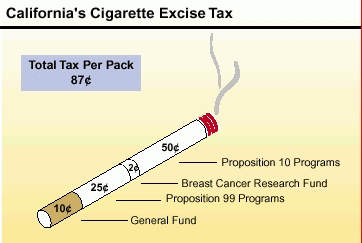
As with other taxes, generally, consumers ultimately share in the burden of the tax in the form of higher retail prices. Other tobacco products (such as cigars, chewing tobacco, pipe tobacco, and snuff) are taxed at a rate that is equivalent to the tax on cigarettes. In addition to state excise taxes, a tax of $0.34 per pack is imposed by the federal government, which will increase to $0.39 per pack on January 1, 2002.
The key policy issue regarding these taxes is whether the programs they support will experience funding pressures, due to declining tobacco consumption associated with health concerns, smoking restrictions, litigation settlement costs, and the increased prices brought on by high excise taxes.
Excise taxes are imposed on the sale of alcoholic beverages by manufacturers on a per-gallon basis. California's alcoholic beverage tax is levied in addition to a federal excise tax. In addition, annual license fees must be paid by retail establishments selling liquor. As shown in the accompanying figure, different tax rates apply, depending on the beverage.
General Fund revenues raised from this tax in 1999-00 totaled an estimated $274�million. Revenues generally declined between 1991-92 and 1996-97, but have remained relatively stable since that time. The majority of revenues come from distilled spirits and beer.
| Alcoholic Beverage Tax Rates | |
| Beverage | Tax Per Gallon |
| Beer, wine, and sparkling hard cider | $0.20 |
| Champagne and sparkling wine | 0.30 |
| Distilled spiritsa | 3.30 |
| a For 100 proof or less. Tax is doubled for higher proof. | |
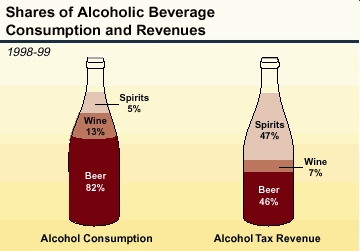
The California State Constitution allows for a state-run lottery and wagering on horse races, as well as bingo for charitable purposes.
The lottery was established by Proposition�37 (November 1984). The California State Lottery Act sets forth how the proceeds of lottery ticket sales shall be distributed--half returned to bettors, up to 16�percent for administrative expenses, and at least 34�percent to education. Lottery wagering was estimated to total $2.6�billion in 1999-00, of which $774�million went to K-12 education, with additional amounts to other public education components. Lottery revenues are a minor source of funds for schools. For instance, they represented approximately 1.7�percent of total K-12 school revenue in 1999-00.
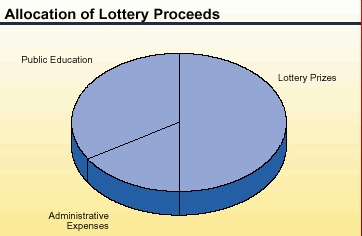
Horse racing license fees and taxes are levied on the amounts wagered at horse racing meets. The tax rate ranges from 0.4�percent to 2�percent depending on the style of racing, the type of wager, and where the wager is placed. In 1999-00, state revenues from these levies amounted to an estimated $35�million, reflecting an approximately 50�percent decline from previous years largely due to wagering-related tax relief enacted in 1998-99.
The SDI tax is levied on employees in the form of payroll deductions in order to fund the disability insurance program. This program provides short-term insurance benefits to offset, in part, lost wages due to nonjob-related illnesses, injuries, and pregnancy. For 2000, the SDI effective contribution rate is 0.65�percent of the first $46,327 of an employee's annual income.
The UI tax is levied on employers. Tax revenues provide partial wage replacement to unemployed workers looking for new work. Employers pay taxes on up to $7,000 in annual wages paid to each worker. The actual tax rate depends on the employer and the amount of benefits paid to former employees. The UI program was created by the federal Social Security Act of 1935 and it is administered by states. All states have similar federal-state programs, but rates and provisions vary.
Return to California's Tax System--A Primer Table of Contents